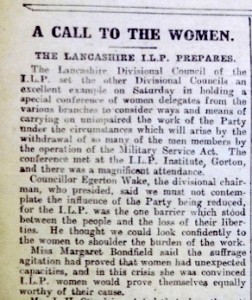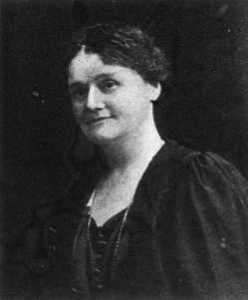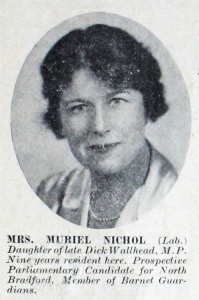From 1916 until the end of the war a growing group of women, many of whom had been active in the suffrage movement, began to promote peace through the Independent Labour Party (ILP). They travelled around the North West addressing meetings in the open air and in ILP halls. This article draws on the experiences of two of those women: Annot Robinson and Muriel Wallhead.
North West Women Speaking for Peace
Posted by Ann Morgan

Report from Labour Leader of 1916 Lancashire ILP women members’ conference. Working Class Movement Library, Salford
At the outbreak of war a small vocal group of North West women, previously involved in the suffrage movement, took up the role of propagandists for peace through the Independent Labour Party (ILP). (1) On Saturday, 27 May 1916 the Lancashire ILP called a conference of women members to decide how the influence of the ILP as a peace organisation could be maintained when the men were imprisoned as conscientious objectors. As a result of the discussions seven suggestions were made. Significant were 4 and 7:
4. Speakers’ classes for women should be formed.
7. Women members should organise themselves to distribute Peace literature, to secure signatures for the Peace Memorial, to conduct a Peace agitation and, at the right time, to arrange women’s Peace processions.’ (2)
Based in Manchester, Annot Robinson and Muriel Wallhead were already amongst the most active speakers and campaigners.
‘Women members should organise themselves to distribute Peace Literature, to secure signatures for the Peace memorial, to conduct Peace agitation, and at the right time, to arrange women’s Peace processions.’
Annot Robinson née Wilkie, 1874 – 1925
As a pacifist, Annot resigned the suffragette movement, convinced that the nations fighting each other should lay down their arms and arrange peace. She was a founder member of the Women’s International League for Peace and Freedom (WILPF), whose purpose was to get women in the nations at war to put pressure on their governments to work for peace. The government prevented her from attending their first conference at The Hague in 1915 but she signed the open letter to the women of Austria and Germany that Christmas, imploring that ‘all urge that peace be made with appeal to wisdom and reason’. (3)

Annot Robinson, taken from her 1921 election poster.
Courtesy of Archives+, Central Library, Manchester
Throughout 1916/17/18 in Manchester Annot addressed open-air meetings in Tib Street on Sunday afternoons, billed as propagandist meetings. A report of one such meeting addressing ‘War Problems’ states that ‘a large crowd attended and listened with fine attention.’ (4) She spoke at meetings in the Clarion Café, Caxton Hall and Beech Mount in Salford. She also took her message to other branches of the ILP in Liverpool, Nelson and the Burnley Women’s Peace Crusade. (5) Sometimes her talks took the form of a lantern lecture. (6)
Meetings were often large: in Burnley she addressed an audience of 500 ‘warm and appreciative women’ in the Co-op Hall. (7) Her talks – ‘The Price of War’, ‘Things As they Are,’ ‘Women and Munitions’ and ‘Equal Pay for Equal Work’ – linked the peace message to the social problems the war was causing on the home front and which were so close to her heart, such as improving the conditions of women munitions workers.
As well as serving on ILP committees, Annot became the chair of the Manchester Central ILP when the men of the branch were imprisoned in 1916. She was also heavily involved in the Women’s Peace Crusade in Manchester, chairing the Women’s Peace Meeting held in Stevenson Square on 22 July 1917, which was broken up by the police. (8) It is interesting to speculate if the final suggestion at the Women’s ILP Conference in May 1916 was the catalyst for the Women’s Peace Crusades, which began in 1917.
As a pacifist, Annot resigned the suffragette movement, convinced that the nations fighting each other should lay down their arms and arrange peace.
Muriel Wallhead, 1893 – 1983
Muriel was brought up in a family that had been involved in the development of the ILP in Manchester so it is no surprise that she became an ardent advocate for peace. (9)
The first record of Muriel speaking is advertised in the Labour Leader where she is billed to speak to Glasgow ILP on Sunday 12 March 1916. (10) The report of her talk to an audience of more than 100 in Leigh that year records that ‘Miss Wallhead dealt forcefully with the necessity for immediately initiating overtures towards peace. Her treatment of the subjects of food prices and the conscription of capitol was received with much sympathy. The usual interruptions of a few irresponsibles rising for a moment to a little storm were subdued in an admirable manner by the speaker.’ (11)

Muriel Nichol (Wallhead), Welwyn Times, 31 March 1938
Courtesy of Hertfordshire Archives and Local Studies (HALS)
In 1917 Muriel spoke in Manchester and West Bromwich to open-air meetings and in July she spent a weekend in Rochdale. August finds her in Barrow-in-Furness, addressing a meeting to which women were especially invited (12). In September she was in Liverpool, twice addressing meetings in Toxteth, Old Swan, West Toxteth and Kensington on ‘Peace’. Her second visit is said to have provided ‘A fine meeting and plenty of good humoured opposition.’ (13) September finds her also in Southport, on the sands, speaking on ‘The Futility of War’ and described as ‘A splendid address and when question time came the opposing party could do no more than howl.’ (14)
In January 1918, when her father was arrested and imprisoned, Muriel took over his speaking engagements. (15) Her father, brother and fiancé were all in prison.
‘Miss Wallhead dealt forcefully with the necessity for immediately initiating overtures towards peace. Her treatment of the subjects of food prices and the conscription of capitol was received with much sympathy.’
More voices for peace
During 1917, other Manchester ILP women speakers joined Annot and Muriel on the speaking circuit. Mrs Agatha Watts spoke in Manchester, Salford, Oldham and Liverpool, (16) and Miss E. Wilkinson in Manchester and Salford, including the open-air meetings in Tib Street. (17) Mrs Swanick told a crowd in Manchester that ‘the point of paramount importance was an early peace’ and Mrs Cooper of Nelson ILP spoke at a ‘splendid meeting’ in Great Harwood. (18) So did the speaking classes encourage women?
What happened to Annot and Muriel when peace was declared?
Annot’s unhappy marriage to Sam Robinson, a utopian socialist and alcoholic, ended when the couple separated towards the end of the war. She stood unsuccessfully twice for Manchester City Council. The WILPF employed her as an organiser and she travelled in Britain, USA and Holland on its behalf, until in 1922 when a lack of money to pay her precipitated a return to teaching in Scotland. She died suddenly during an operation in Perth Royal Infirmary in 1925. (19)
Muriel married her conscientious objector husband, James Nichol, in 1920. (20) She had one son, born in 1922 in Bradford, where she stood unsuccessfully for Parliament in 1935. Moving to Welwyn Garden City, Muriel served as the chair of the Urban District Council from 1937 – 1945. She entered Parliament in 1945 as the MP for Bradford, losing her seat in 1950 due to boundary changes. Her unsuccessful attempt to gain a seat in 1955 for Bradford North marked her retirement from politics. (21)
- The ILP was formed in 1893 as the Independent Labour Party, which became a co-founder of the Labour Party at the beginning of the 20th century. As Matthew Brown describes: ‘On 31 July 1914 the ILP’s Keir Hardie and Arthur Henderson signed an “Appeal to the British Working Class” on behalf of the British section of the International Socialist Bureau, which called for them to “act promptly and vigorously in the interests of peace” ’ (Independent Labour Party Publications: WWI: ‘Workers, Stand for Peace’ [online], February 28, 2014. Available at: http://www.independentlabour.org.uk/main/2014/02/28/wwi-‘workers-stand-for-peace’/)
- Labour Leader, 1 June 1916.
- Boothroyd, Isaac, 2016. Annot Erskine Robinson: a forgotten Manchester Suffragette [online]. Available at: https://gm1914.wordpress.com/2016/03/03/annot-erskine-robinson-a-forgotten-manchester-suffragette-2/
- Labour Leader, 22 June 1916.
- Labour Leader, 2 March 1916.
- According to the website Lantern Lectures (http://myweb.tiscali.co.uk/magiclantern/lectures.htm): ‘the magic lantern was a tool which served both to entertain and to educate. In many instances a lecture was read to the audience as slides were projected. Special lecturer’s lamps were employed that shone the light directly on to the text yet allowed the rest of the room to remain in darkness. Often these lamps had some sort of signalling device (usually a bell or, more discretely, a tiny flash of coloured light). This signal indicated to the lanternist to project the next slide’.
- Labour Leader, 20 September 1917.
- Ronan, Alison, 2003. The Women’s Peace Crusade in Manchester: June-September 1917. North West Labour History Journal, Issue 28.
- Labour Leader, 25 April 1916.
- Labour Leader, 9 March 1916.
- Labour Leader, 3 August 1916.
- Labour Leader, 23 August 1917.
- Labour Leader, 20 September 1917.
- Labour Leader, 20 September 1917.
- Labour Leader, 3 January 1918.
- Labour Leader, 19 July, 26 July, 2 Aug, 23 August 1917.
- Labour Leader, 23 August, 30 August, 13 September 1917.
- Labour Leader, 25 October 1917.
- Dundee Women’s Trail, 2016. Wilkie, Annot (Robinson) – Socialist, Suffragette [online]. Available at: http://www.dundeewomenstrail.org.uk/wilkie-annot-robinson-socialist-suffragette-wilkie-helen-socialist-suffragette/
- Find My Past [online], 2016. Available at: http://ww1.findmypast.org.uk
- Centre for Advancement of Women in Politics [online], 2001. Av

